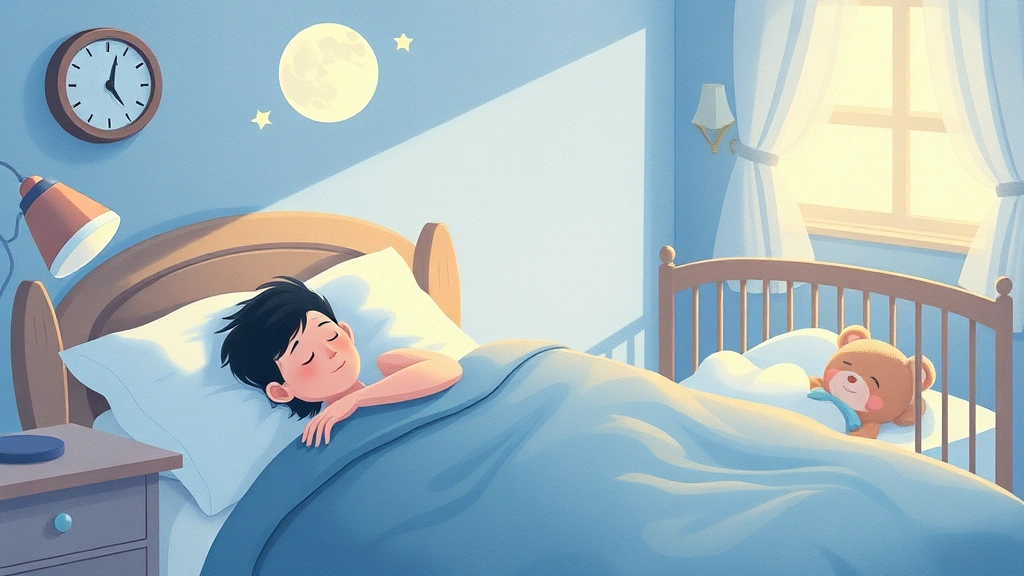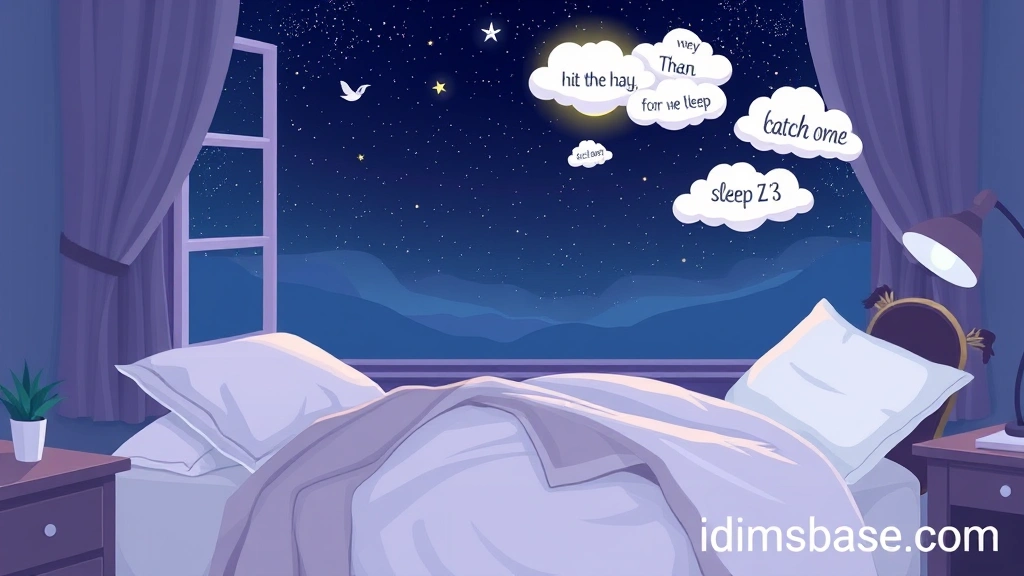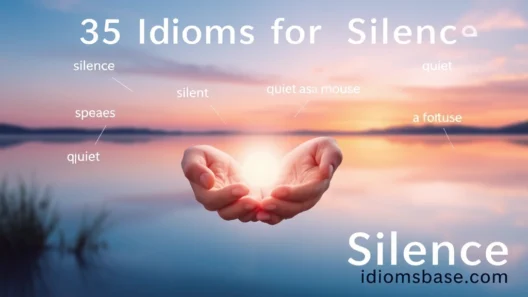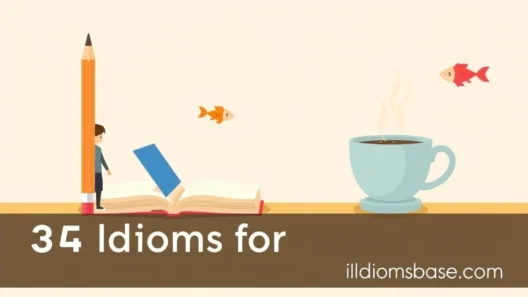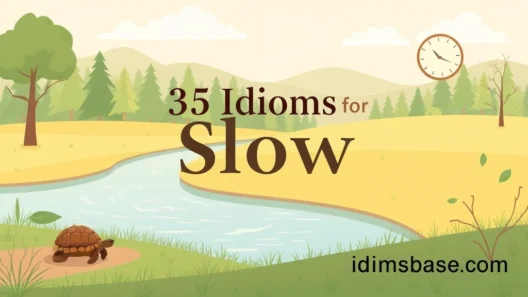Do you ever feel so tired you could sleep for a week? Or maybe you’re so excited you just can’t fall asleep, no matter how hard you try? Sleep is a universal human experience, and it's no surprise that our language is full of colorful expressions to describe it! From drifting off to dreamland to being wide awake, English has a fascinating array of idioms that perfectly capture the nuances of rest and wakefulness.
Idioms are those fantastic phrases where the meaning isn't obvious from the individual words. They add flavor, wit, and a touch of mystery to our conversations. When it comes to sleep, these expressions truly shine, painting vivid pictures of everything from deep slumber to restless nights.
Ready to explore the wonderful world of sleep idioms? Let’s dive in and discover 35 of the most common and captivating expressions related to catching some Zs! You'll be using these like a pro in no time!
35 Idioms for Sleep
Here's a delightful list of idioms that describe various states of sleep, from the deepest slumber to the inability to sleep at all.
Deep Sleep & Sound Sleep
These idioms describe someone who is sleeping very deeply and peacefully.
- Sleep like a log: Imagine a heavy log, unmoving and still. That's how soundly someone is sleeping! Example: After that long hike, I slept like a log.
- Sleep like a baby: Babies are known for their profound, peaceful sleep. This idiom evokes a sense of complete tranquility. Example: The warm milk helped him sleep like a baby.
- Be fast asleep: This simply means someone is deeply asleep and won't wake easily. Example: Don't disturb her, she's fast asleep.
- Be out cold: Often used when someone is unconscious due to exhaustion or an accident, but also for very deep sleep. Example: He was out cold the moment his head hit the pillow.
- Be dead to the world: This vivid idiom suggests someone is so deeply asleep they're oblivious to everything around them. Example: The kids were dead to the world after their birthday party.
- Catch some Z’s: The letter 'Z' is often used in cartoons to represent snoring or sleep. This is a casual way to say you're going to get some sleep. Example: I need to catch some Z’s before my early morning flight.
- Hit the hay/sack: A very informal way to say you're going to bed. It comes from the days when mattresses were stuffed with hay or sacks. Example: It's getting late, I'm going to hit the hay.
- Be in a deep sleep: A straightforward way to say someone is sleeping profoundly. Example: The thunder didn't wake her; she was in a deep sleep.
- Drift off (to sleep): This expresses a gentle, gradual transition into sleep. Example: I drifted off to sleep while listening to the rain.
- Conk out: An informal idiom meaning to fall asleep very quickly, often due to exhaustion. Example: I was so tired I just conked out on the couch.
- Pass out: Similar to "conk out," meaning to fall asleep suddenly, often from exhaustion. Example: He worked all day and just passed out as soon as he got home.
- Knock out: To cause someone to fall asleep or become unconscious. Often used in a more active sense. Example: That long drive really knocked me out.
Waking Up & Being Awake
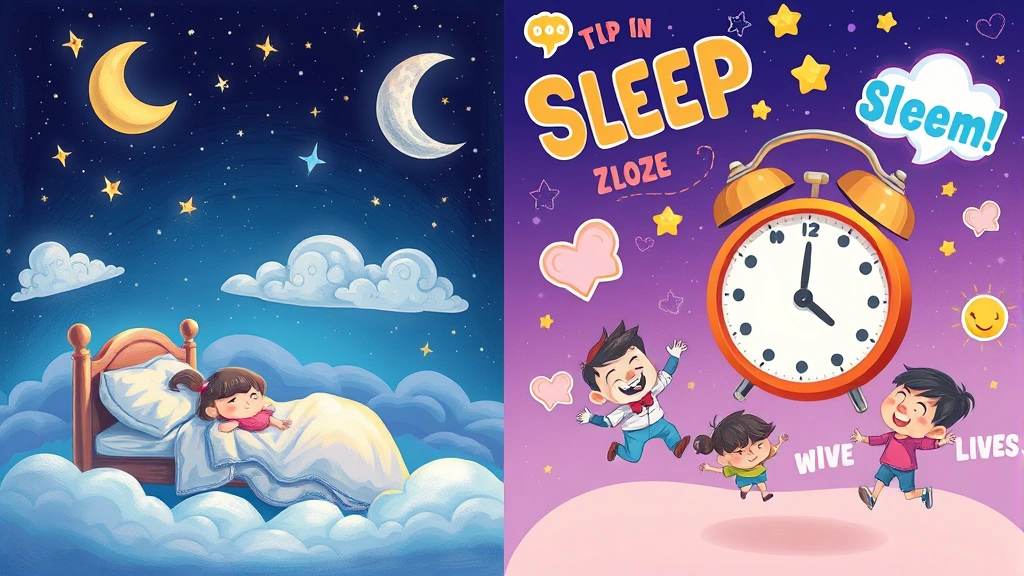
These idioms describe the state of being awake or the act of waking up.
- Be wide awake: To be completely alert and not at all sleepy. Example: I drank coffee too late and now I’m wide awake.
- Be bright-eyed and bushy-tailed: To be fully awake, energetic, and enthusiastic, often in the morning. Example: She was bright-eyed and bushy-tailed for her first day at the new job.
- Rise and shine: An encouraging phrase said to someone who is waking up, urging them to get out of bed and be active. Example: "Rise and shine, sleepyhead! It's breakfast time!"
- Wake up on the wrong side of the bed: To wake up feeling grumpy, irritable, or in a bad mood. Example: He must have woken up on the wrong side of the bed today; he's so quiet.
- Burn the midnight oil: To work or study late into the night. It implies sacrificing sleep for work. Example: I had to burn the midnight oil to finish my project on time.
- Pull an all-nighter: To stay awake all night, typically to study or work. Example: We pulled an all-nighter to get the presentation ready.
- Be up with the lark/sun: To wake up very early in the morning. Larks are known for their early morning singing. Example: My grandmother is always up with the lark, tending to her garden.
- Not get a wink of sleep: To not sleep at all, or to sleep very little. Example: The noisy neighbors meant I didn't get a wink of sleep last night.
- Toss and turn: To move restlessly in bed, unable to sleep. Example: I tossed and turned all night, worrying about the exam.
Sleepiness & Needing Sleep
These idioms describe feeling tired or needing to go to sleep.
- Be sleepy/drowsy: Simply feeling ready to sleep. Example: The warm room made me feel very sleepy.
- Be tired/fatigued: Feeling worn out and needing rest. Example: After running the marathon, I was completely fatigued.
- Be ready to drop: To be extremely tired, almost to the point of collapse. Example: After working two shifts, I was ready to drop.
- Be half asleep: To be partially awake but still very drowsy. Example: He answered the phone, but he was half asleep.
- Fighting sleep: Trying to stay awake when you are very tired. Example: The toddler was fighting sleep during the car ride.
- Nod off: To fall asleep unintentionally, often while sitting upright. Example: He kept nodding off during the boring lecture.
- Feel heavy-eyed: To have eyes that feel tired and want to close, indicating sleepiness. Example: After reading for hours, I started to feel heavy-eyed.
- Crave sleep: To have a strong desire for sleep, often due to severe tiredness. Example: All I could do was crave sleep after that exhausting week.
Other Sleep-Related Idioms
These idioms cover a broader range of sleep-related situations.
- Sleep on it: To delay making a decision until the next day, allowing time to think about it overnight. Example: I'm not sure what to do; I think I'll sleep on it.
- Put to sleep: To make someone or something (like a pet) go to sleep. It can also mean to euthanize an animal. Example: The lullaby helped to put the baby to sleep.
- Sleep in: To sleep later than usual in the morning. Example: On weekends, I love to sleep in until noon.
- Sleep through (something): To sleep so soundly that a noise or event doesn't wake you. Example: I slept through the entire thunderstorm.
- Catch up on sleep: To get extra sleep to compensate for previous lack of sleep. Example: I need this weekend to catch up on sleep.
- Go to bed with the chickens: To go to bed very early, like chickens do at dusk. Example: My grandparents always go to bed with the chickens.
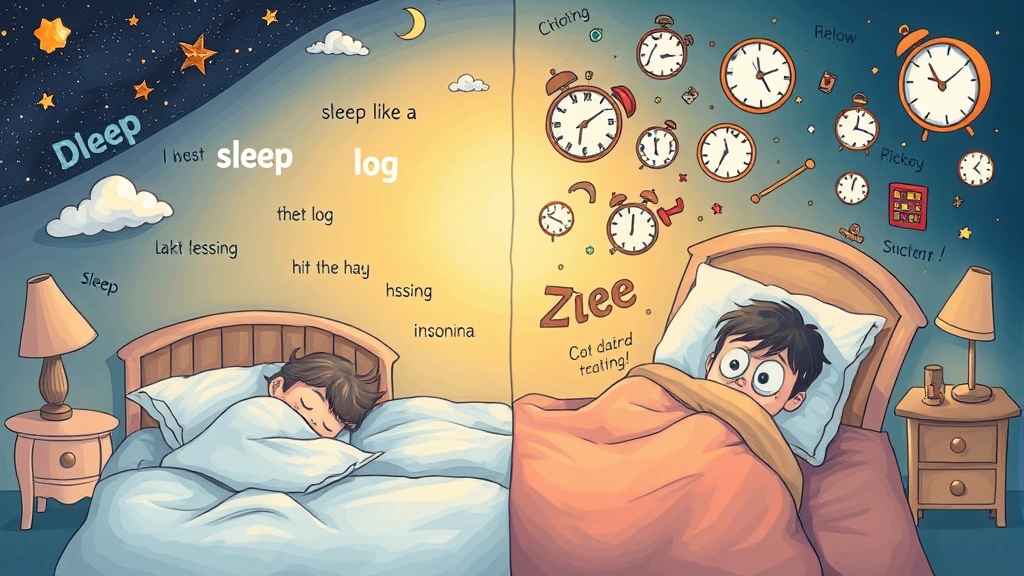
Key Takeaways
- Diverse Expressions: English offers a rich vocabulary for describing sleep, from deep slumber to restless nights.
- Informal & Formal: Many sleep idioms are informal ("hit the hay," "catch some Z's"), while others are more neutral ("be fast asleep").
- Context is Key: The meaning of an idiom often depends on the surrounding context.
- Enhance Communication: Using these idioms can make your language more vivid, engaging, and natural.
- Cultural Insight: Idioms often reflect cultural nuances and historical practices related to sleep.
Frequently Asked Questions (FAQs)
Q1: Why are there so many idioms about sleep?
A1: Sleep is a fundamental human need and experience. It's something we all do, and it affects our mood, health, and daily lives. Because it's such a universal and impactful part of our existence, it's natural that language would develop many ways to describe its various states and effects. These idioms add color and precision to how we talk about rest.
Q2: What's the difference between "sleep like a log" and "sleep like a baby"?
A2: Both idioms describe very deep sleep, but they carry slightly different connotations. "Sleep like a log" emphasizes stillness and unmoving, heavy sleep, often implying exhaustion. "Sleep like a baby" emphasizes peaceful, tranquil, and undisturbed sleep, often associated with innocence and contentment. You could say someone "slept like a log" after a marathon, but "slept like a baby" after a relaxing bath.
Q3: Can I use these idioms in formal writing?
A3: It depends on the idiom and the context. Many sleep idioms, especially the more casual ones like "hit the hay" or "catch some Z's," are best reserved for informal conversations or creative writing. More universally understood phrases like "fast asleep" or "woke up on the wrong side of the bed" might be acceptable in slightly less formal articles or personal essays. For very formal academic or professional writing, it's generally safer to use more direct, literal language.
Q4: How can I remember all these idioms?
A4: The best way to remember idioms is to use them!
- Practice: Try incorporating a few new idioms into your daily conversations.
- Context: Pay attention to how native speakers use them in movies, books, or shows.
- Visualize: Create a mental image for each idiom (e.g., a log for "sleep like a log").
- Group them: Like we did in this article, group them by meaning (deep sleep, waking up, etc.).
- Keep a journal: Write down new idioms and example sentences.
Q5: Are there sleep idioms specific to certain regions or countries?
A5: Yes, absolutely! While many idioms are widely understood in English-speaking countries, some can be more prevalent in certain regions. For example, some British English idioms might be less common in American English, and vice-versa. However, the idioms listed here are generally well-understood across most major English-speaking populations, making them great for a global audience. The beauty of language is its diversity!
